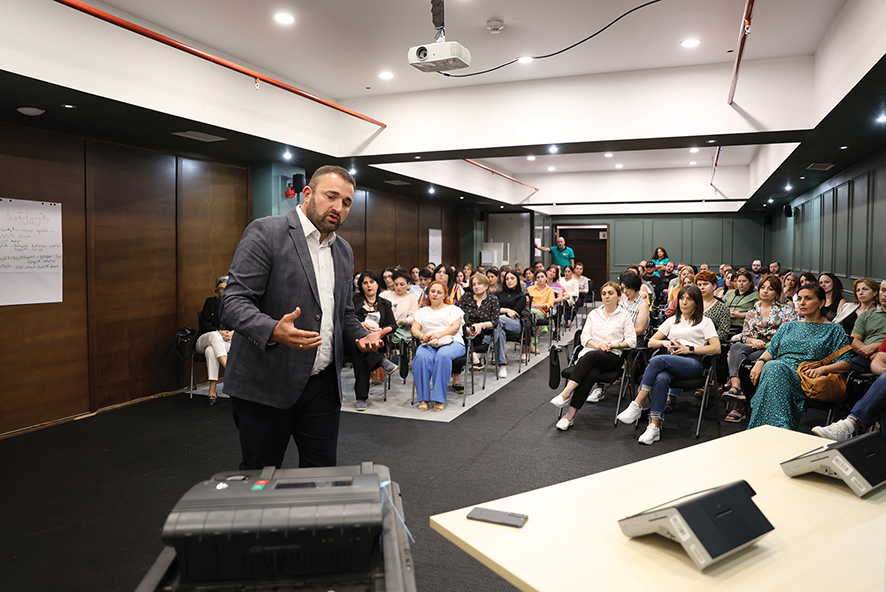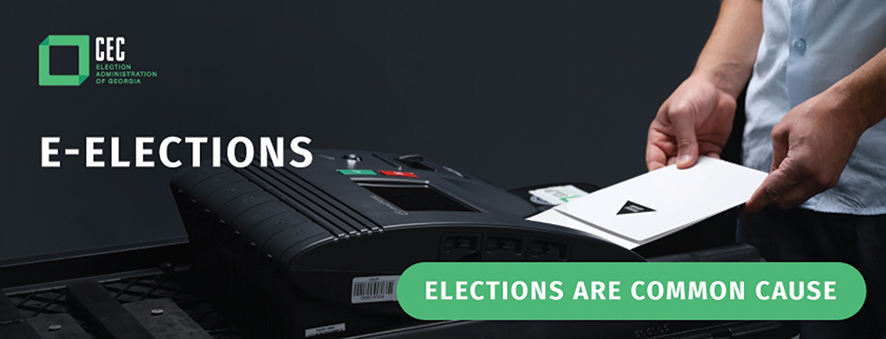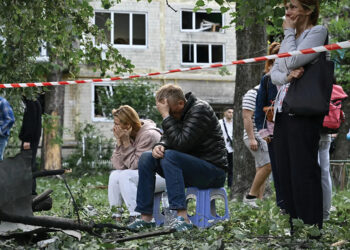On October 1st, parliamentary by-elections of Georgia and extraordinary mayoral elections will be held – what news awaits voters at the polling station? what are the changes for voters, and what is the progress of introducing electronic technologies in the election process? The chairperson of the Central Election Commission, Giorgi Kalandarishvili, will respond to this and other questions.
The second election will be held this year using electronic technologies, where and who will the voters choose?
On October 1st, parliamentary by-elections of Georgia and extraordinary mayoral elections will be held. On October 1st, the voters will elect the majoritarian deputy of the Parliament of Georgia, Gori-Kaspi, and extraordinary mayoral elections will be held in Gurjaani.
These elections are of special importance because, in addition to the fact that the voters will be able to choose their representatives in the Parliament of Georgia or in the self-governing body, they will do so using new technologies. As in the spring elections, the election administration will use electronic technologies on a large scale. Why this is important? It has already been determined that 90% of the voters who come to the polling stations for the parliamentary elections in 2024 will be able to vote using electronic technologies, and this will be the first precedent for the largest-scale use of technologies in elections in Georgia. Therefore, it is important to thoroughly study and test the technologies, and the elections held on April 29 gave us the opportunity to do so, which, it can be said, represented a kind of “general rehearsal”. It was during these elections that we tested technologies on a large scale and saw in practice how the technology worked and what its advantages were. The reports of all local organizations were studied, and challenges and needs were identified.
The election administration has already used electronic technologies on various scales in 7 elections, which it has been testing and piloting since 2018. The mentioned pilots, as well as visits to other countries to observe their elections and share experiences, gained us important experience.
On October 1, together with electoral stakeholders, we will see again in practice whether there will be any issues that will require some attention from our side in order to face the elections in 2024 even more prepared.
90% of the voters who come to the polling stations for the parliamentary elections in 2024 will be able to vote using electronic technologies
How will the elections be held on October 1? Is it necessary to go to the polling station or will it be possible to vote remotely?
On October 1, 85.3% of voters will have the opportunity to see for themselves how electronic election technologies work. 133 polling stations will be opened for the elections. According to the decision of the CEC, voting will be held at 103 polling stations using voter verification and vote counting machines.
The introduction of these new technologies does not mean that it will be possible to vote from home, from your own device. In order to make a choice, the voter must go to the polling station or, if there is a relevant reason, request a mobile ballot box. We will use two types of technology, including both voter registration/verification machines and vote counting machines. I want to emphasize that in no case will the devices be connected to the network or the internet, so as to prevent the threat of cyber interference. The registrar will verify the data of the voter who has arrived at the polling station with an electronic verification device. Only the list of voters of that particular polling station will be loaded into the verification machine. The verification machine allows for double verification. In particular, after scanning/checking the identity document on the machine, the photo of the document owner will be displayed on the screen, based on which his identity will be confirmed. A corresponding receipt will be printed and signed by the voter.
The ballot paper will also be different in this case, the voter should not circle the number of the desired candidate, but should color the circle in front of the candidate’s name. In addition, the ballot has additional security features – an individual QR code and a barcode, which prevents a ballot from another district or the same ballot from being repeatedly placed in the box.
Of course, the secrecy of voting is preserved – after coloring the circle in front of the desired candidate in the secret voting booth, the voter must turn over the ballot and place it in the vote counting machine using a special frame envelope. This machine will automatically count the votes and after the completion of the voting, it will print the summary of the preliminary results of the voting immediately after the completion of the mandatory procedures.
Ballots are also counted manually and only after that a summary protocol is drawn up.

How will those voters who did not make it into this 85% participate in the elections?
Elections will be held according to the traditional methods in districts where the number of voters is less than 300 and which are more than 20 kilometers away from the location of the District Election Commission, as well as in areas which will be created in exceptional cases or are in a hard-to-reach place.
The fact that the elections are held in these precincts using the traditional method does not mean that we will reduce our efforts. Voting in these precincts will definitely be held in accordance with appropriate international standards, all the more so in light of the fact that to some extent these areas will also be modernized and, in addition, in order to increase transparency, the ballots will be digitized and made public.
What are the advantages of introducing technology in elections? Will the time for counting votes and announcing the results will be reduced?
For years now, the election administration has been using electronic election technologies in pilot mode and studying the possibilities of implementation. In addition, we are systematically familiarizing ourselves with the experience of other countries in this direction. It is the piloting of electoral technologies and the gained experience that has shown that the use of technologies in the electoral process ensures the simplicity of the procedures and to some extent insures against human errors. The voting process is more comfortable for voters; the time of voting and voter’s delay at the polling station is reduced; and vote counting devices allow for prompt processing of data, thus providing timely information to the public.
However, it is important that both modernized and traditional precincts ensure transparency, which is manifested by manual counting the ballots. In particular, after the machine counts the ballots and prints the preliminary data, manual recounting is still required, after which a summary protocol with legal force is created. However, we are not waiting for the results of manual counting to publish the preliminary data. The vote counting machine automatically counts the votes and after the completion of the voting, as soon as the mandatory procedures are completed, the machine will print out the results, which will be sent to the CEC as soon as possible and will also quickly be made public.
On October 1, 85.3% of voters will have the opportunity to see for themselves how electronic election technologies work at 103 polling stations
We have a new approach and solution as to how to send the preliminary data printed at the polling station to the Election Commission from both modernized and traditional polling stations: Tablets. This allows for the summary protocols to be photographed, and data to be scanned and instantly transferred to the central server, which was successfully tested for the first time during the April 29 elections.
When voting using an electronic device, how will the privacy of the vote be protected?
Secrecy is a fundamental principle of elections and will certainly be ensured and protected. The voter must place the ballot in the vote counting machine using a special frame-envelope, in an inverted form. Therefore, it is impossible for anyone in the precinct to identify who the voter voted for.
With the introduction of electronic technologies, what changes directly for voters? Can only persons with an ID card and passport participate in electronic elections, or is it possible to use a laminated certificate?
The verification machine provides an unmistakable confirmation that the voter participated in the elections, for which ID cards and passports are used. On October 1, it will be possible to vote in the elections with a laminated identity document, because the verification machines have the function of manual data entry, but in the 2024 elections, voter verification will be possible only if an electronic ID card and passport are presented.
Is it possible that some of the machines at the polling station will malfunction? What happens in this case?
According to the experience of the election administration, the probability that any of the machines will go out of order is minimal. But, of course, such cases are provided for. The main thing is that in no case will the voting be stopped. For example, if one verification machine fails, the number of registrars will be reduced and accordingly the failed machine will be removed and verification will continue using another machine. In the event that all the machines are out of order, the voters’ desk lists will be sealed at the polling station and the voting process will continue in the traditional way.
There will be at least two vote counting machines at every polling station. If one machine fails, it will be replaced by another machine, and if both fail, the scanner machine attached to the top of the box will be removed and the process will continue in the old way (the voter will place the ballot in the slot of the box).
To what extent is the election administration ready to use technology to conduct the October 1 election and what impact will it have on the 2024 election?
Of course, the election administration is ready and doing everything it can to ensure that the election process is conducted in full compliance with the legislation, transparently and at a high professional level. In addition, the election administration has already planned purchases for the technical support of the elections, and in cooperation with the state procurement agency, on the basis of an open international tender, a vendor company was identified. During the years 2023-2024, the “Smartmatik” company will serve the election administration with electronic election devices and relevant software. Smartmatic has a lot of experience in conducting electronic elections in different countries and produces the appropriate equipment itself. Since 2000, the company has been a global leader in the election industry and has experience modernizing elections in more than 30 countries. Among them, it has implemented projects of this type in Great Britain, USA, Argentina, Brazil, Mexico, Albania, Bulgaria, Estonia, Belgium, and the Philippines.
The voting process is more comfortable for voters; voting time is reduced, and vote counting devices allow for prompt processing of data, thus providing timely information to the public
In order to conduct elections at a highly professional level, it is a priority for us to provide information to voters, to implement large-scale information and educational campaigns. An action plan has already been developed, which defines all the activities in detail. Educational projects, this year and next year will be completely devoted to the issue of participation in voting by electronic means. In addition, innovative voter information campaigns are planned. There are educational projects of the CEC and the Education Center – for example, “CEC Election School”, “Election Camps”, “Election Administrator Courses”, “Elections and Young Voters”, etc. In addition, for each election, an information campaign “Talking to voters” is held, within the framework of which representatives of district and precinct election commissions meet voters and inform them of election procedures, hand out information brochures, and help them verify their data in the voter list. Demonstrations of electronic technologies in crowded places have already been carried out and are planned. Information-advertisement rings will be placed in the media. We will use every opportunity to bring all the important information to the voters.
However, as I already mentioned, these elections are of special importance, because electronic technologies will be used on a large scale in these elections and will allow us to once again observe and study all the peculiarities of the use of technologies. Among them, let’s observe which means of information works more effectively, and take into account the experience gained in order to conduct the 2024 elections in accordance with international standards.
Modernization of elections is a very complex issue. Therefore, I think that the election administration, political unions, representatives of the civil sector and the media should work together to promote the raising of voters’ awareness in the direction of technology and the conduct of elections in accordance with international standards, as well as the establishment of an election culture corresponding to the new reality, because elections are a common cause.















